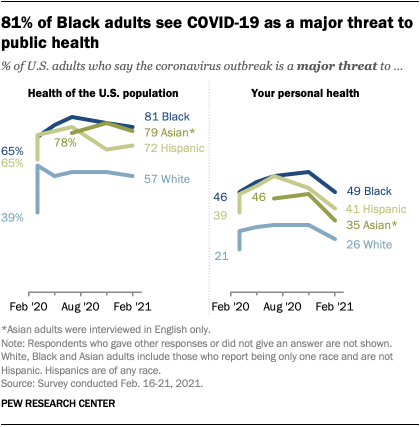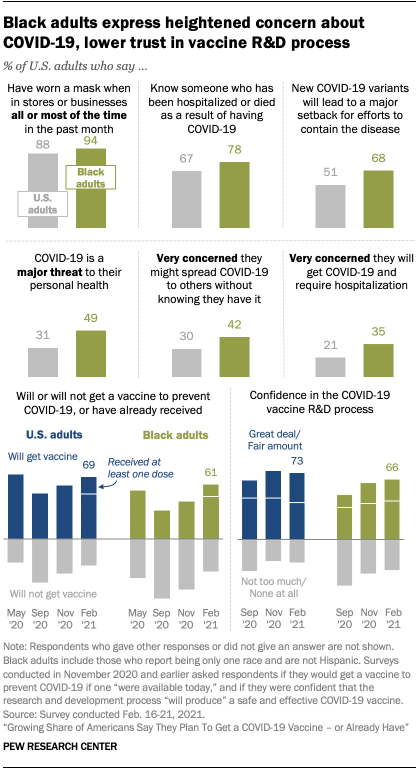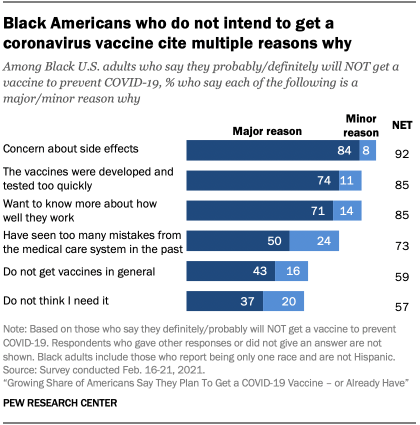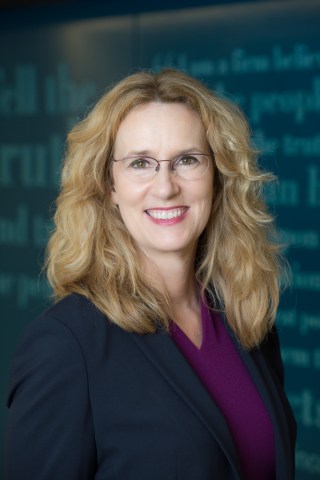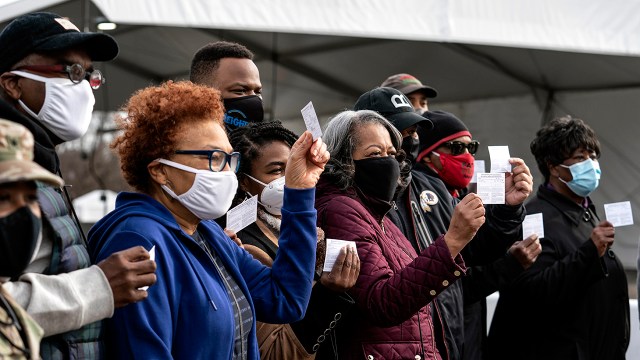
Black Americans stand out from other racial and ethnic groups in the U.S. for their high levels of concern about the coronavirus pandemic, with 81% considering the outbreak a major threat to public health and about half (49%) seeing it as a major threat to their personal health, according to a Pew Research Center survey conducted in February.
About a third of Black adults (35%) are very concerned that they themselves will get the coronavirus and require hospitalization, and another 29% are at least somewhat concerned about this possibility.
A recent study from the Centers for Disease Control and Prevention found that Black life expectancy has fallen 2.7 years from pre-pandemic levels, compared with one year for the overall population – a stark reminder of the virus’s disproportionate impact on Black Americans.
Pew Research Center conducted this study to understand how Americans are continuing to respond to the coronavirus outbreak. For this analysis, we surveyed 10,121 U.S. adults, including 911 Black adults, from Feb. 16 to 21, 2021.
Everyone who took part in the survey is a member of the Center’s American Trends Panel (ATP), an online survey panel that is recruited through national, random sampling of residential addresses. This way, nearly all U.S. adults have a chance of selection. The survey is weighted to be representative of the U.S. adult population by gender, race, ethnicity, partisan affiliation, education and other categories. Read more about the ATP’s methodology.
Here are the questions used for this analysis, along with responses, and its methodology.
The Center survey finds 78% of Black adults personally know someone who has been hospitalized or who died as a result of having COVID-19.
Black Americans also stand out from other groups for their concern about spreading the disease. About four-in-ten say they are very concerned about unknowingly spreading the disease to others, and 94% say they have taken the precaution of wearing masks or other face coverings at stores or businesses all or most of the time over the past month. At least seven-in-ten Black Americans consider a range of restrictions on public activity necessary, including limiting restaurants to carry-out service and closing K-12 schools to in-person learning.
While Black Americans are more concerned about many aspects of the outbreak, a smaller majority (61%) say they will definitely or probably get a COVID-19 vaccine, including 15% who already have, compared with 69% of White adults, 70% of Hispanic adults and 91% of Asian adults. (The survey was conducted with English-speaking Asian Americans only.)
As with the overall U.S. adult population, older Black adults are more inclined than younger adults to say they have gotten a coronavirus vaccine or that they will. And among Black adults, men are more inclined than women to get a coronavirus vaccine, a pattern also seen in the general population.
Black adults express less confidence in the coronavirus vaccine research and development process – a judgment closely aligned with intent to get vaccinated. Among the 34% of Black Americans with low trust in the vaccine R&D process, just 26% say they will get a vaccine or have already done so; 72% say they will not.
In addition to concerns about the vaccine development process, the potential for side effects looms large among those disinclined to get a coronavirus vaccine.
Among the 37% of Black Americans who say they will not get a coronavirus vaccine, 84% cite concern about side effects from the new vaccines as a major reason, while 74% say a major reason is that the vaccines were developed and tested too quickly. Another 71% of this group cite their desire to know more about how well they work. Half of Black Americans who do not intend to get a vaccine say a major reason is that they have seen too many mistakes from the medical care system in the past.
Note: Here are the questions used for this analysis, along with responses, and its methodology.
